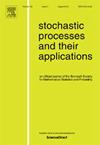带权重的遍历定理及其在随机测量、均质化和流体力学中的应用
IF 1.1
2区 数学
Q3 STATISTICS & PROBABILITY
引用次数: 0
摘要
我们证明了概率空间上群 Zd 作用的加权平均多维遍历定理。对于衰减速度适当的实函数ψ,在第 n 层的权重为 n-dψ(j/n), j∈Zd 形式。我们讨论了在具有长距离随机跳跃率的简单点过程上随机游走的随机均质化和淬火随机均质化在随机度量中的应用,从而可以删除[Faggionato 2023, Theorem 4.4]中的技术假设 (A9)。最后一个结果还涉及一些半群和解析收敛,尤其与通过同质化和对偶性推导相互作用粒子系统的淬火流体力学极限有关。因此,我们证明,如果取消上述假设 (A9),[Faggionato 2022, Theorem 4.1]中关于点过程的对称简单排斥过程的淬火流体力学极限仍然有效。本文章由计算机程序翻译,如有差异,请以英文原文为准。
An ergodic theorem with weights and applications to random measures, homogenization and hydrodynamics
We prove a multidimensional ergodic theorem with weighted averages for the action of the group on a probability space. At level weights are of the form , , for real functions decaying suitably fast. We discuss applications to random measures and to quenched stochastic homogenization of random walks on simple point processes with long-range random jump rates, allowing to remove the technical Assumption (A9) from [Faggionato 2023, Theorem 4.4]. This last result concerns also some semigroup and resolvent convergence particularly relevant for the derivation of the quenched hydrodynamic limit of interacting particle systems via homogenization and duality. As a consequence we show that also the quenched hydrodynamic limit of the symmetric simple exclusion process on point processes stated in [Faggionato 2022, Theorem 4.1] remains valid when removing the above mentioned Assumption (A9).
求助全文
通过发布文献求助,成功后即可免费获取论文全文。
去求助
来源期刊

Stochastic Processes and their Applications
数学-统计学与概率论
CiteScore
2.90
自引率
7.10%
发文量
180
审稿时长
23.6 weeks
期刊介绍:
Stochastic Processes and their Applications publishes papers on the theory and applications of stochastic processes. It is concerned with concepts and techniques, and is oriented towards a broad spectrum of mathematical, scientific and engineering interests.
Characterization, structural properties, inference and control of stochastic processes are covered. The journal is exacting and scholarly in its standards. Every effort is made to promote innovation, vitality, and communication between disciplines. All papers are refereed.
 求助内容:
求助内容: 应助结果提醒方式:
应助结果提醒方式:


